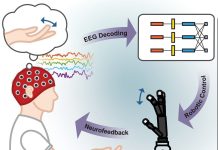
Enhancing our brain’s capabilities is an exciting area for researchers like me.
We want to improve attention and memory skills.
This could help air traffic controllers focus better and could also help people with dementia remember more.
New studies suggest that brain stimulation could be the key to boosting mental function.
Electric Cap Magic in Boston University Lab
At Boston University, my team and I are looking at how a technology called “transcranial alternating current stimulation”, or tACS, affects mental functions.
This involves people wearing a special cap. The cap has electrodes that send weak electric currents to the scalp.
By directing these currents to certain brain areas, we can alter brain activity. We cause brain cells, or neurons, to fire in a rhythmic way.
Why Rhythms Matter
You might ask why we want neurons to fire rhythmically. Well, research tells us that when brain cells fire in rhythm, they communicate better.
When people have mental health disorders, these rhythms often go wrong. The goal of tACS is to make the brain fire in healthy rhythms, especially when the brain can’t do this on its own.
Comparing tACS to Other Methods
There’s another type of brain stimulation called tDCS. This sends a direct electric current to the brain.
But tACS is newer and we don’t know as much about it. The big question is whether it can change brain rhythms enough to affect mental function.
Studies Show Promising Results
When researchers disagree, a helpful approach is to combine many studies into one big study. This is called a meta-analysis.
One such study in 2016 suggested that tACS can indeed change mental function. But since then, we have a lot more studies and more advanced tACS technologies.
Our team has now completed a new meta-analysis. We’ve looked at over 100 studies involving more than 2,800 people. This is the biggest and most detailed meta-analysis on this topic so far.
The Impact of tACS on Mental Functions
Our study found that tACS consistently improves mental function. It was particularly good at enhancing executive function.
This means it helps people adapt to new or conflicting information. It also improved people’s ability to pay attention and remember things for short and long periods.
We also looked at studies involving older adults and people with mental health disorders. In both groups, tACS seemed to improve cognitive function.
Future Applications of tACS
Interestingly, a special type of tACS can target two brain areas at once and change how they communicate. This could be really useful for certain psychiatric conditions.
For example, people with depression might struggle to feel pleasure, while people with bipolar disorder might feel pleasure too intensely.
If tACS can change mental function in both directions, it could be adapted to help specific patients.
Work in the field of tACS is bringing us closer to safely improving mental function without medication. Current evidence suggests that tACS is promising.
As we improve its design, it could help produce stronger and more long-lasting changes in mental function.
If you care about brain health, please read studies about how the Mediterranean diet could protect your brain health, and Vitamin B supplements could help reduce dementia risk.
For more information about brain health, please see recent studies that cranberries could help boost memory, and many older people have this non-Alzheimer’s dementia.
The study was published in Science Translational Medicine.
Copyright © 2023 Knowridge Science Report. All rights reserved.



